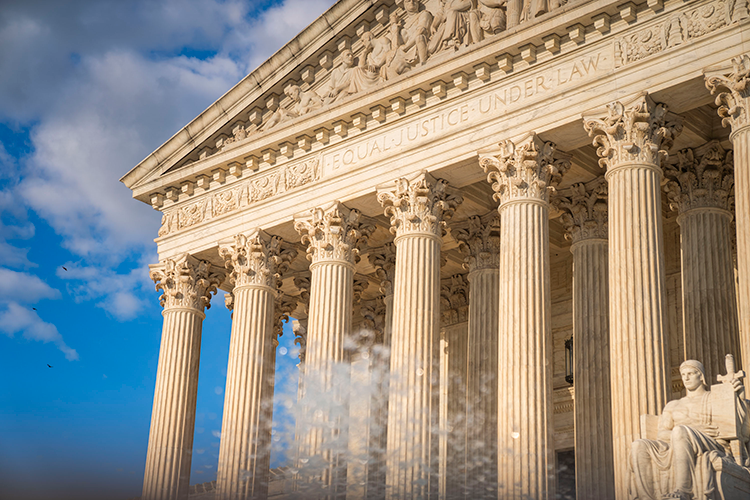Supreme Court is 'dour and diligent' as it debates 'potential sleeper case;' are arguments 'abusive'?

The U.S. Supreme Court on Monday appeared “dour and diligent” as it considered exhaustion requirements in lawsuits for constitutional violations, according to an article in the New York Times. (Photo by Allison Robbert/The Washington Post)
The U.S. Supreme Court on Monday appeared “dour and diligent” as it considered exhaustion requirements in lawsuits for constitutional violations, according to an article in the New York Times.
At issue is whether litigants must exhaust state remedies before suing in state courts under Section 1983 of the Civil Rights Act. According to the New York Times, the only exception to the dour atmosphere happened when Justice Elena Kagan and Justice Brett Kavanaugh smiled following a brief whispered comment.
The dispute arises in “a potential sleeper case,” according to an ABA Journal column by Erwin Chemerinsky, the dean of the University of California at Berkeley School of Law and a Journal contributor.
The New York Times combined its coverage of the case with information on a new study by Richard K. Neumann Jr., a professor at the Maurice A. Deane School of Law at Hofstra University. He argued that Supreme Court arguments have become “abusive and sterile” as a result of rapid-fire questions by justices that give attorneys little time to speak without interruption.
The questioning style is unique in U.S. history and in the common law world, Neumann said. Fifty years ago, attorneys could speak for long stretches, but that is no longer the case. One exception is the two minutes that lawyers are given to speak without interruption as they begin arguments, a practice instituted in 2019.
Justices don’t discuss cases before deliberations, and afterward “their discussion is, by many accounts, stilted and compressed,” the New York Times reports. As a result, oral arguments have outsized importance.
“Today in oral argument,” Neumann wrote, “justices show off their wit, badger lawyers, try to persuade each other and behave as though they’re at an academic symposium, rather than in a courtroom solving practical problems. They try to persuade each other there because they have a policy forbidding private conversations among themselves about cases.”
Neumann doesn’t think that political polarization causes the justices’ behavior. Instead, the oral argument style may be due to the justices living “in a self-sealed bubble,” due to the influence of justices’ personalities, or due to their reluctance to debate cases outside of arguments.
“In any other setting,” Neumann wrote, “this would quickly be seen as a dysfunctional workplace, where nine people who make collective decisions refuse to converse with each other about work for which they share responsibility.”
The plaintiffs suing over exhaustion requirements had experienced delays in obtaining unemployment benefits during the COVID-19 pandemic. They wanted to sue under Section 1983 before waiting for a final decision by the Alabama Department of Labor. The Alabama Supreme Court had ruled that the legislature banned state court jurisdiction before claimants exhausted state remedies.
“If the Supreme Court were to affirm the Alabama Supreme Court,” Chemerinsky wrote for the Journal, “it would be a dramatic change in what the law has been for over a half-century and radically change how civil rights cases are litigated.”
Although the Supreme Court could rule that exhaustion may be required in state court but not federal court suits, the forum shouldn’t matter under precedent saying an exhaustion requirement is inconsistent with Section 1983, Chemerinsky wrote.
The Alabama Supreme Court had acknowledged contrary Supreme Court precedent but said Section 1983 plaintiffs can’t compel state courts to adjudicate federal claims outside the state courts’ jurisdiction, according to the cert petition.
Kavanaugh had cited the Supreme Court precedent and quoted from an amicus brief filed by religious groups, according to the New York Times. The brief had argued that “costly and time-consuming proceedings can grind religious minority litigants into submission before they are able to have their claims heard in court.”
The case on exhaustion requirements is Williams v. Washington.
Neumann’s study is The Disappearance of Conversation in Oral Arguments—And What It Reveals About the Supreme Court.



